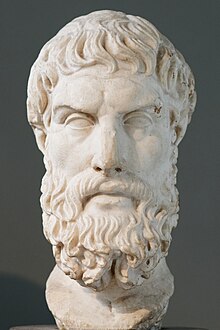Talk:Atheism/reasons/draft
Draft version of the new "Reasons for atheism" section
[edit]Forms of atheism
[edit]Numerous forms of atheism of all scopes have appeared and been developed throughout history. Certain of these forms rely on particular rationale or philosophical arguments, and as such can be categorized according to their various approaches. The German Protestant writer Johann Heinrich Alsted was the first to attempt such a systematization of the forms of atheism in his Encyclopaedia (1630). The broadest demarcation is between practical atheism and theoretical atheism.[1]
Practical atheism
[edit]- In practical, or pragmatic, atheism, also known as apatheism, individuals live their lives as if there is no God, and natural phenomena are explained without resorting to God. The existence of gods is not denied, but designated unnecessary or useless; God neither provides purpose to life, nor influences everyday life, according to this view.[1] Within the scientific community, practical atheism is exhibited in the form of methodological naturalism - the "tacit adoption or assumption of philosophical naturalism within scientific method with or without fully accepting or believing it."[2]
Theoretical atheism
[edit]
"Is [God] willing to prevent evil, but not able? then is he impotent. Is he able, but not willing? then is he malevolent. Is he both able and willing? whence then is evil?"
Theoretical atheism explicitly posits arguments against belief in God. These arguments assume various forms, including psychological, sociological, metaphysical, and epistemological explanations, among others. Proponents of theoretical atheism may utilize one or more of these arguments to support their views.
Epistemological arguments
[edit]Epistemological atheism argues that man cannot know God or determine the existence of God. The foundation of epistemological atheism is agnosticism, which takes a variety of forms. In the agnosticism of immanence, the consciousness is considered as an absolute, and all human thought is locked within the subject. The rationalistic agnosticism of Kant and the Enlightenment only accepts knowledge deduced with human rationality; such atheists believe that gods are not discernible as a matter of principle, and therefore cannot exist (cf. ontological epistemology). Skepticism, based on the ideas of Hume, atheism asserts that certainty about anything is impossible, so one can never know the existence of God. The allocation of agnosticism to atheism is disputed; it can also be regarded as an independent, basic worldview.
Other forms of atheistic argumentation that may qualify as epistemological assert the meaninglessness or unintelligibilty of basic terms such as "God" and statements such as "God is all-powerful" (cf. logical positivism, ignosticism). Theological noncognitivism holds that the statement "God exists" does not express a proposition, but is nonsensical or cognitively meaningless. It has been argued both ways as to whether such individuals classify into some form of atheism or agnosticism. Philosophers A. J. Ayer and Theodore M. Drange reject both categories, stating that both camps accept "God exists" as a proposition; they instead place noncognitivism in its own category.[3][4]
Metaphysical arguments
[edit]Metaphysical atheism is based on metaphysical monism - the "homogeneity of reality". Absolute metaphysical atheists, arguing for materialistic monism, cite the trend toward philosophical materialism as rationale for explicitly denying the existence of God. Relative metaphysical atheists maintain an implicit denial of God based on the incongruity between their individual philosophies and attributes applicable God, such as transcendence, a personal aspect, or unity. Examples of the latter include pantheism, panentheism, and deism. [1]
Psychological, sociological, economical arguments
[edit]Philosophers such as Ludwig Feuerbach and Sigmund Freud argued that God and other religious beliefs are human inventions, created to fulfill various psychological and emotions wants or needs. Karl Marx and Friedrich Engels, influenced by the work of Feuerbach, argued that God is a human invention, and that belief in God and religion are social functions, used by those in power to oppress the working class. According to Mikhail Bakunin, "the idea of God implies the abdication of human reason and justice; it is the most decisive negation of human liberty, and necessarily ends in the enslavement of mankind, in theory and practice." He reversed Voltaire's famous aphorism that if God did not exist, it would be necessary to invent Him, writing instead that "if God really existed, it would be necessary to abolish Him."[5]
Logical and evidential arguments
[edit]Logical atheism holds that the various conceptions of God, such as the personal God of Christianity, are ascribed logically inconsistent qualities. Such atheists present deductive arguments against the existence of God, which assert the incompatibility between certain traits, such as perfection, creator-status, immutability, omniscience, omnipresence, omnibenevolence, transcendence, personhood (a personal being), nonphysicality, justice and mercy.[6]
Theodicean atheists believe that the world as they experience it cannot be reconciled with the qualities commonly ascribed to God by theologians. They argue that if there is an omniscient, omnipotent, omnibenevolent God, then why is there evil and suffering in the world, and why is God's love from many people?
Anthropocentric arguments
[edit]Axiological, or constructive, atheism rejects the existence of God in favor of a "higher absolute", such as Humanity. This form of atheism favors humanity as the absolute source of ethics and values, and permits individuals to resolve moral problems without resorting to God. Marx, Nietzsche, Freud, and Sarte all used this argument to convey messages of liberation, full-development, and unfettered happiness.[1]
- ^ a b c d "Atheism". Universal Encyclopedia of Philosophy, Vol I. International Society of Thomas Aquinas. Retrieved 2007-04-07.
- ^ Schafersman, Steven D. "Naturalism is an Essential Part of Science and Critical Inquiry". Conference on Naturalism, Theism and the Scientific Enterprise. Department of Philosophy, The University of Texas. February 1997. Revised May 2007. Retrieved 2007-04-09.
- ^ Drange, Theodore M. "Atheism, Agnosticism, Noncognitivism". 1998. Retrieved 2007-04-07.
- ^ Ayer, A. J.. Language, Truth and Logic. Dover. 1946. pp. 115-16. In a footnote, Ayer attributes this view to "Professor H. H. Price".
- ^ God and the State, Michael Bakunin, 1882
- ^ Various authors. "Logical Arguments for Atheism". Internet Infidels, The Secular Web Library. Retrieved 2007-04-09.
